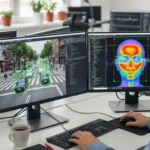In the modern world, coding has become an essential skill for tech professionals and anyone looking to enhance personal development. Whether you’re interested in improving problem-solving skills, boosting your career opportunities, or pursuing a passion for technology, learning to code can be a transformative experience. This guide will help you navigate the coding process and show how it can contribute to personal growth.
Understanding the Benefits of Learning to Code
Before diving into coding, it’s important to understand why learning this skill can significantly benefit your personal and professional life.
Enhancing Problem-Solving and Critical Thinking
Coding is fundamentally about solving problems. When you write code, you instruct a computer to perform tasks based on specific commands. This process sharpens your critical thinking and problem-solving skills.
- Breaking Down Problems: Coding teaches you how to break large problems into smaller, manageable tasks, fostering a structured approach to challenges.
- Creative Solutions: Learning to code opens opportunities to think creatively about approaching problems from different angles.
Expanding Career Opportunities
In today’s job market, coding skills are in high demand. Coding can give you a competitive edge in marketing, design, finance, or any other field.
- Job Market Relevance: Many employers value coding skills, even in non-technical roles, as essential.
- Freelance and Entrepreneurial Paths: If you’re interested in freelancing or starting a business, coding skills can enable you to build websites, apps, and other digital products yourself.
Building Projects for Personal Satisfaction
Coding can be incredibly satisfying, allowing you to build real-world applications and solutions. You can apply coding skills to your projects by creating a personal blog, automating repetitive tasks, or developing an app.
- Tangible Outcomes: It gives you a sense of achievement to see your code come to life in working programs.
- Continuous Learning: Coding is a field where there is always something new to learn, keeping you engaged and constantly improving.
Choosing the Right Programming Language
When starting your coding journey, one of the first decisions is selecting the right programming language. Different languages serve different purposes, so your choice depends on your goals.
Beginner-Friendly Languages
For beginners, choosing a language that is easy to understand and widely supported by learning resources is important.
- Python: It is often recommended as a good starting language due to its simple syntax and versatility. It’s used in web development, data science, automation, and more.
- JavaScript: If you’re interested in web development, JavaScript is an essential language for creating interactive websites.
- Scratch: For absolute beginners, especially younger learners, Scratch is a visual programming language that teaches the basic coding principles through drag-and-drop blocks.
Languages for Specific Applications
Once you grasp the basics, you can explore languages that cater to specific interests or industries.
- Java: If you’re interested in mobile app development (especially Android apps), Java is a widely used language.
- Ruby: Known for its simplicity and productivity, Ruby is popular in web development through the Ruby on Rails framework.
- C++/C#: These languages are ideal for those looking into game development or performance-critical applications, such as desktop software.
Learning the Syntax and Concepts
Each programming language has syntax—rules that dictate how code is written and structured. Learning syntax is essential for getting started.
- Basic Concepts: Foundational coding concepts such as variables, loops, and conditionals are universally applicable across languages.
- Practice Syntax: Regular practice is key to mastering syntax, and using platforms like Codecademy, freeCodeCamp, or Replit can help reinforce these concepts.
Setting Up Your Development Environment
To start coding, you need to set up a development environment on your computer or in the cloud where you can write and test your code.
Choosing the Right Tools
Different programming languages require different tools for writing, running, and debugging code. Here are some of the most commonly used tools for beginners:
- Text Editors: Simple tools like Notepad++ or Sublime Text allow you to write code in various languages.
- Integrated Development Environments (IDEs): Tools like Visual Studio Code and PyCharm provide a more advanced environment with features such as code highlighting, error detection, and built-in terminals.
- Online Platforms: Many websites, such as Replit and Glitch, let you write and run code directly in your browser, which is great for beginners.
Installing Necessary Software
Each language typically requires certain software to run and test code.
- Python Installations: You’ll need to install Python from python.org and use its integrated development environment (IDLE) or a third-party IDE like PyCharm.
- JavaScript Environment: To use JavaScript, you need a web browser like Chrome or Firefox and a code editor. Node.js can also be installed for server-side development.
- Compilers for Other Languages: You may need to install a compiler for languages such as C++ or Java to compile your code into an executable program.
Understanding Version Control
Learning version control is essential as you progress in coding. Version control lets you track changes to your code and collaborate with others.
- Git and GitHub: Git is a widely used version control system, and GitHub is a platform for hosting projects and collaborating with others. Learning Git early on will be beneficial as you start creating projects.
Learning the Fundamentals of Programming
Once you have your environment set up, it’s time to explore the core concepts of programming.
Mastering Basic Syntax and Concepts
Every language has its syntax, but there are core concepts that are common across all programming languages:
- Variables and Data Types: These store and manipulate data in your programs. Understanding how to use different data types, such as integers, strings, and booleans, is key.
- Conditionals and Loops: These are used to control the flow of your program. Conditional statements (like if, else) and loops (like for, while) help your program make decisions and repeat tasks.
- Functions: Functions allow you to organize your code into reusable blocks, making your programs more efficient and easier to manage.
Practicing with Small Projects
Applying what you learn by working on small coding projects is essential. These can range from simple calculators to games or automated tasks.
- Automating Tasks: Try automating simple tasks, such as renaming files or sending emails, with code.
- Games and Puzzles: Create small interactive games, such as tic-tac-toe or number-guessing, to practice coding logic.
Building a Portfolio
As you progress, start compiling your work into a portfolio. It will help you track your growth and be a valuable asset when applying for jobs or freelance work.
- GitHub Portfolio: Host your projects on GitHub so others can see your code and you can demonstrate your skills to potential employers.
Utilizing Resources and Communities
One of the best aspects of learning to code is the wealth of resources and communities available to support your journey.
Online Courses and Tutorials
Many free and paid platforms offer courses for beginners and advanced learners alike.
- freeCodeCamp: Offers free interactive courses on web development, data science, and more.
- Codecademy: Provides beginner-friendly courses in multiple programming languages.
- Coursera/edX: These platforms offer more formalized coding courses, often in partnership with universities.
Joining Coding Communities
Joining coding communities can accelerate your learning and help you troubleshoot issues you encounter.
- Stack Overflow: A question-and-answer platform where you can ask coding questions and get help from experienced developers.
- Reddit & Discord: Many programming subreddits and Discord servers are filled with learners and professionals sharing tips, resources, and feedback.
Practice Challenges and Hackathons
Participating in coding challenges or hackathons can push you to learn more and apply your skills in a competitive setting.
- LeetCode/HackerRank: Websites offering coding challenges to improve problem-solving skills.
- Hackathons: Participate in local or virtual hackathons to collaborate with others on real-world coding projects.
Conclusion
Getting started with coding for personal development can open doors to countless opportunities. You can build a strong foundation by understanding the benefits, choosing the right programming language, setting up a development environment, learning the fundamentals, and utilizing the wealth of online resources. Whether you aim to improve problem-solving skills, enhance your career prospects, or create personal projects, coding is a powerful tool to help you grow personally and professionally. Keep practicing, stay curious, and enjoy the journey of becoming a coder!





